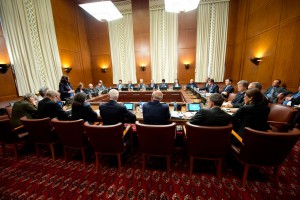UN-brokered Intra-Syrian talks officially start in Geneva with opposition meeting
1 February 2016 – The delayed intra-Syrian talks to end five years of bloody warfare officially started in Geneva today with two hours of talks between the United Nations mediator and the opposition High Negotiations Committee (HNC).
“As far as we are concerned, their arrival at the Palais des Nations and initiating the discussions with us is the official beginning of the Geneva talks,” said UN Special Envoy for Syria Staffan de Mistura, who already met the HNC yesterday, but at their hotel, not at the UN’s Geneva headquarters.
Mr. de Mistura, who is mediating the indirect talks between Government and opposition factions in close proximity diplomacy, which will see him shuttling between the parties in different rooms, will meet Government representative tomorrow morning and plans a second meeting with the HNC in the afternoon to go more deeply into the issues raised today.
These concern the opposition’s desire to see, for the talks’ duration, a reduction in violence, release of detainees and lifting the sieges that have driven several towns to the brink of starvation, with dozens reported dead.
“Of course we do respect very much and we heard very clearly their very clear position,” Mr. de Mistura told a news briefing. “We feel they have a very strong point because this is the voice of the Syrian people asking for that. When I meet Syrian people they tell me, please don’t just have a conference, have something also that we can see and touch while you are meeting in Geneva,” he said.
He noted that in Vienna, where the International Syria Support Group (ISSG) – comprising the Arab League, the European Union, the United Nations, and 17 countries including the United States and Russia – laid the groundwork for the Geneva talks, there was a message that “in parallel there should be a serious discussion about a ceasefire.”
Mr. de Mistura has made clear that he is under no illusions about the difficulties in ending a war that has killed over 250,000 people, sent over 4 million fleeing the country, displaced 6.5 million internally, and put 13.5 million people inside the country in urgent need of humanitarian aid.
“There will be a lot of posturing, we know that, a lot of walk-outs and walk-ins because a bomb has fallen or because someone has done an attack, and you will see that happening,” he said last week.
Asked today what his immediate short-term objectives are, he replied: “The first immediate objective is to make sure that the talks continue and that everyone is on board. It’s crucial that no one should be feeling excluded and that everyone should be concretely, constructively but also effectively be part of it.”
In reply to another question, he said he has not yet received a list of detainees which he has asked for and wants “because I think that a list of the names, particularly of women and children detained, should be the first among the signals that in fact there is something different happening.”
